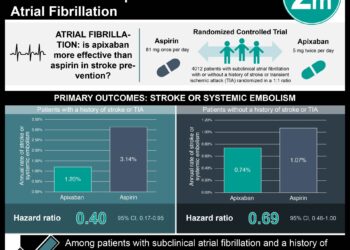Aspirin use associated with reduction in cardiovascular events but increase in bleeding risk
1. In this systematic review and meta-analysis, while aspirin use among patients without cardiovascular disease was associated with fewer adverse cardiovascular events, it was not associated with a reduction in all-cause mortality.
2. The use of aspirin in patients without cardiovascular disease was associated with increased risk of major bleeding.
Evidence Rating Level: 1 (Excellent)
Study Rundown: In patients with a history of cardiovascular disease, aspirin use has been associated with secondary prevention of stroke and myocardial infarction. However, the utility of aspirin for primary prevention in patients without a history of cardiovascular disease remains poorly understood. In this systematic review and meta-analysis including more than 160,000 patients, aspirin was associated with a reduction in the likelihood of adverse cardiovascular outcomes, such as cardiovascular mortality, nonfatal myocardial infarction, and nonfatal stroke, though there was no reduction in all-cause mortality. Aspirin was also found to significantly increase the risk of major bleeding events in this patient population.
While this study informs physicians regarding the use of aspirin as primary prevention of cardiovascular outcomes, it does not include a subgroup analysis to reveal any possible racial or gender differences in these outcomes. Previous studies have demonstrated that cardiovascular disease progression has both gender and racial differences, thus performing a subgroup analysis would allow physicians to better counsel their patients on the risks and benefits of aspirin use.
Click to read the study in JAMA
Click to read an accompanying editorial in JAMA
Relevant Reading: Vital signs: prevalence of key cardiovascular disease risk factors for million hearts 2022 – United States, 2011-2016
In-Depth [systematic review and meta-analysis]: This study identified 1385 articles, of which, 21 met inclusion criteria and reported on 13 studies. These studies included 164,225 patients with a total of 1,050,511 patient-years of follow up. The primary cardiovascular outcome was a composite of cardiovascular mortality, nonfatal myocardial infarction, and nonfatal stroke (ischemic and hemorrhagic). The primary bleeding outcome was major bleeding of any kind as defined by the individual studies. Aspirin use was associated with a significant reduction in the composite cardiovascular outcome compared to no aspirin use (Hazard Ratio 0.89; CI95 0.84 to 0.95; number-needed-to-treat 265). This reduction in the composite cardiovascular outcome was present for patients who were both at low and high risk of cardiovascular events. The use of aspirin was not associated with a significant reduction in all-cause mortality (HR 0.94; CI95 0.88 to 1.01). Aspirin use was associated with an increased risk of major bleeding events compared to no aspirin use (HR 1.43; CI95 1.30 to 1.56; number-needed-to-harm 210). Aspirin use was associated with a 1.34 times higher likelihood of intracranial hemorrhage and a 1.56 times higher likelihood in major gastrointestinal bleeding.
Image: PD
©2019 2 Minute Medicine, Inc. All rights reserved. No works may be reproduced without expressed written consent from 2 Minute Medicine, Inc. Inquire about licensing here. No article should be construed as medical advice and is not intended as such by the authors or by 2 Minute Medicine, Inc.







